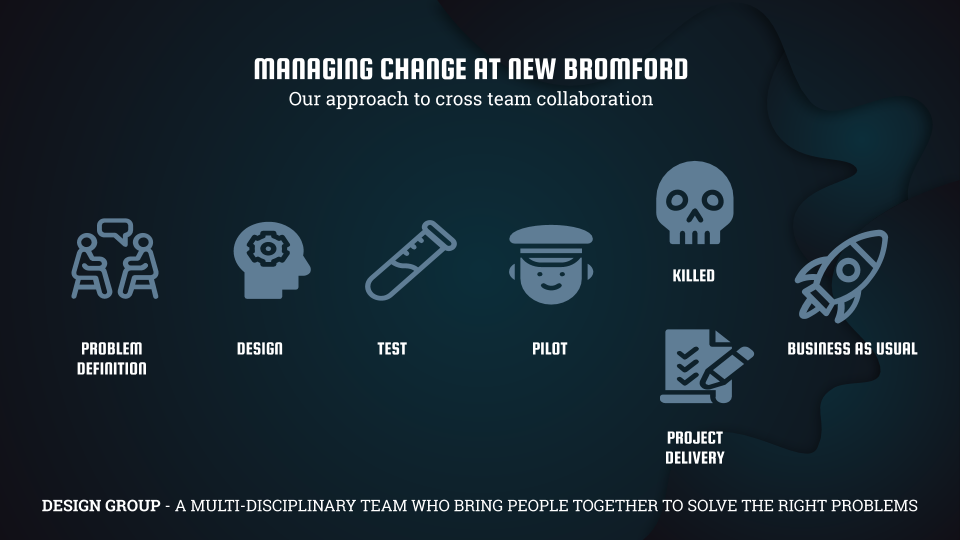Everyone says they love collaboration.
Our open offices are designed to encourage collaboration.
We recruit for people who are collaborative in nature.
The digital tools we use are aimed at fostering greater collaboration.
We promote the benefits of collaboration , or even co-creation, with our customers and service users.
Collaboration has replaced innovation as the buzzword of the moment.
In truth though, our actual behaviors show we don’t like collaborating.
We often don’t have the time that is required to work through differing perspectives. We have difficulty in working with others who hold alternative opinions. And – let’s face it – many of us have a need to be right and get our own way.
Despite the collaboration rhetoric – most of us prefer existing and working in silos.
So why is that?
In 1988 Phil. S. Ensor coined the term the functional silo system. His contention was that narrow, specialised teams and jobs were easy to manage but imposed a very damaging learning disability on the organisation.
- We become focused on addressing organisational fixes rather than exploring the underlying symptoms.
- Social chasms emerge resulting in people not seeing any problem in context. Indeed – cross organisational problem solving can break down.
- And as every function focuses on its own objectives and KPIs – the organisation slowly becomes reactive.
Despite all that though – the silo actually has a great deal going for it. Within a silo it is much easier to define and implement an initiative or outcome.
Basically, silo working means you can ‘Get Shit Done Quickly’. Without interference.
And almost all our organisational KPIs reward GSDQ activity rather than the purposeful thinking and patience that collaboration requires.
Additionally the exponential growth in the number of managers (There are five million managers in the UK today, 10 times as many as there were 100 years ago) has boosted opportunities for silo thinking at the expense of collaboration.
And of course silos don’t just exist at organisational level. Our sectors organise themselves into siloed echo chambers – each with their own system of professional bodies, conferences and award ceremonies.
Truth is – most of us simply don’t have strong in-person collaboration skills.
It’s highly unlikely you were taught about collaborative problem solving at school. Many of us were educated to find answers through solitary work.
It wasn’t until just two years ago that it was even measured, with a report outlining the difference in the collaborative ability of pupils across 52 countries.
As the report notes, students typically learn individually, and at the end of the school year, their individual achievements are certified. But the more interdependent the world becomes, the less it needs lone problem solvers and the more it needs great collaborators and orchestrators.

Interestingly it found that on average across OECD countries, girls are 1.6 times more likely than boys to be top performers in collaborative problem solving.
Arguably more managers means less collaboration. And more male managers could make it worse still.
Rewiring Organisations For Collaboration
So we’ve established: collaboration isn’t easy, it takes a long time to do right and it doesn’t come naturally to most people.
At Bromford we’ve been redesigning the organisation to move away from silos and towards collaboration. Our previous desire for operational efficiency at all costs had adversely affected interoperability between teams.
The answer was to build a ‘shared consciousness’ through the creation of a network of 33 linked service area’s and teams.
A multidisciplinary ‘design team’ acts as a conduit for all change across these areas. This recognises that today innovation is rarely the product of individuals working in isolation, rather – it is an outcome of how we mobilise, share and integrate knowledge.

I’ll be the first to say that working in this way is hugely challenging. I have a lot less autonomy than I did five years ago. If you’re into ego and power I’d suggest you’d find this an uncomfortable place to be.
Saying you’re a collaborative organisation isn’t true and helps no-one. True collaboration won’t happen unless you make it happen.
Creating an atmosphere where people can respectfully disagree, where all voices are heard and leaders bring out the best in everyone takes discipline and skill.
We need a safe space for exploration. We need permission to cross organisational silos and assemble diverse co-creators. We need to move out of our ivory towers and shift innovation as close as we can to the colleagues and customers who know the jobs that need doing.
If we don’t teach, measure, encourage or reward collaboration it doesn’t tend to happen.
We need less talk of it, and a lot more doing.

Leave a reply to flowchainsensei Cancel reply